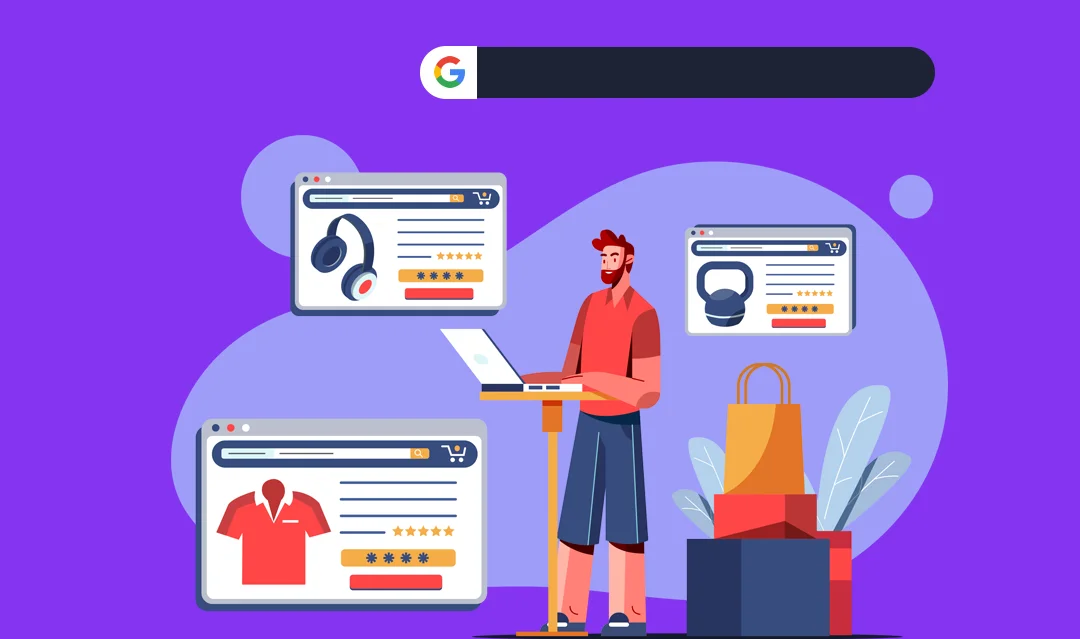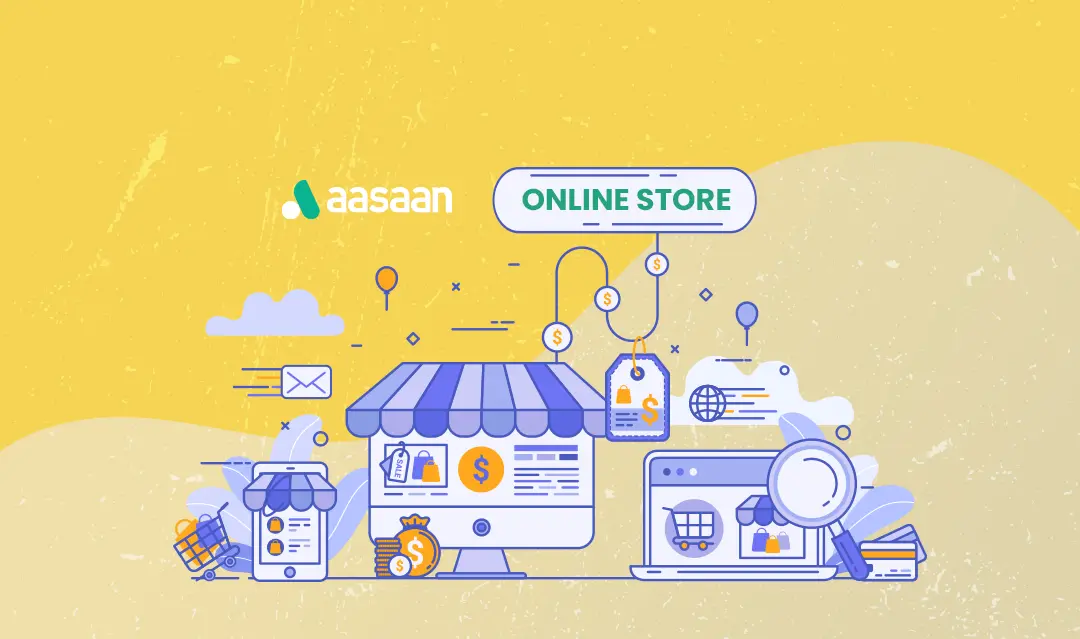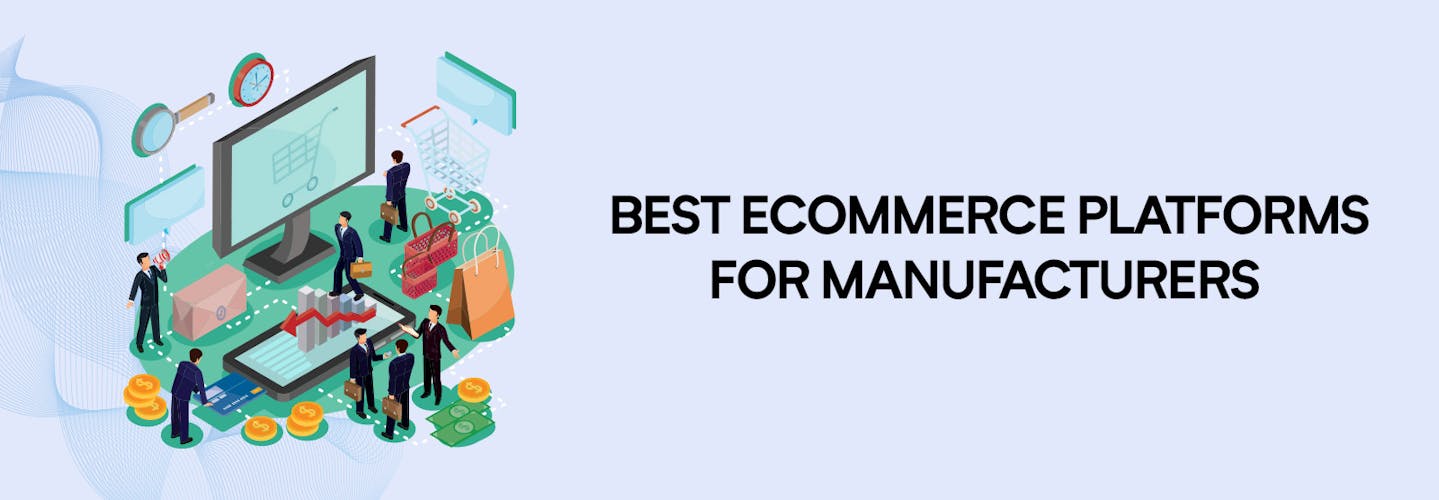
10 Best Ecommerce Platforms For Manufacturers
Ecommerce has come a long way in recent years. It has evolved from a niche market to a mainstream way of doing business. This is especially true for manufacturers, who are increasingly turning to ecommerce to reach new customers and grow their businesses.
Here are some real-world stats that illustrate the growing importance of ecommerce for manufacturers:
- US B2B ecommerce sales are expected to reach $1.8 trillion by 2023.
- Manufacturers who sell online generate 23% more revenue than those who don’t.
- Ecommerce can help manufacturers save up to 30% on marketing costs.
- 70% of customers are more likely to buy from a manufacturer with an online store.
- Presenting a brand consistently across all platforms can increase revenue by up to 23%.
These stats show that ecommerce can be a valuable tool for manufacturers to reach new customers, grow their businesses, and save money.
The Evolution of Ecommerce for Manufacturers
The first ecommerce platforms for manufacturers were designed for B2B transactions. These platforms were typically complex and expensive, and they were not well-suited for the needs of small and medium-sized manufacturers.
In recent years, there has been a growing number of ecommerce platforms that are specifically designed for manufacturers. These platforms are more user-friendly and affordable, and they offer a wider range of features that are tailored to the needs of manufacturers.
As a result of this evolution, ecommerce has become a viable option for manufacturers of all sizes. It can help them to reach new customers, improve their bottom line, and grow their businesses.
1.2. Importance of Choosing the Right Ecommerce Platform
There are a number of factors to consider when choosing an ecommerce platform for manufacturers. These factors include:
- The size and complexity of your business
- The types of products you sell
- Your target market
- Your budget
It is important to choose a platform that is right for your specific needs. If you choose the wrong platform, it could be difficult to manage your ecommerce store and it could affect your sales.
Factors to Consider When Creating an Ecommerce Store for Manufacturers
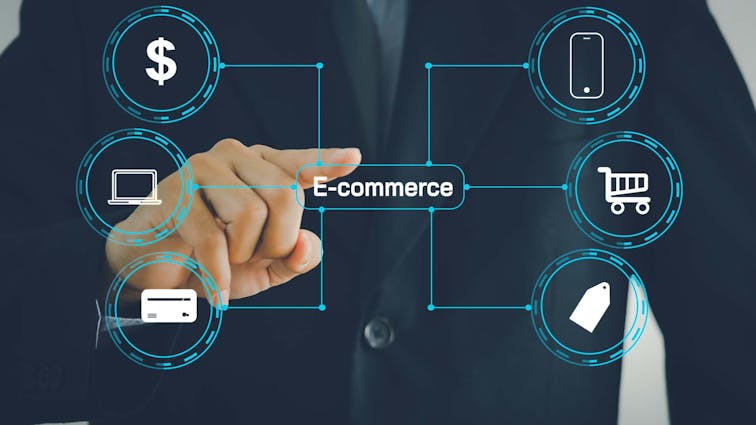
Creating an ecommerce store for manufacturers involves several considerations to ensure success. Here are some key factors to consider:
1. Target Audience: Define your target audience clearly. Understand their needs, preferences, and buying behavior. This will help in designing the store, developing marketing strategies, and selecting the products to be sold.
2. Product Selection: Select the products carefully. Consider the demand, competition, and profitability of the products. Also, consider the logistics involved in manufacturing, storing, and shipping the products.
3. Platform Selection: Choose the right ecommerce platform. Consider the features, scalability, customization options, and cost of the platform. Also, consider the technical skills required to manage the platform.
4. User Experience: Design the store with the user experience in mind. The store should be easy to navigate, mobile-friendly, and visually appealing. Also, consider the loading speed of the store.
5. Payment and Shipping: Select the payment and shipping options carefully. Consider the preferences of your target audience, the cost involved, and the logistics.
6. Marketing and SEO: Develop a marketing and SEO strategy to promote the store and attract customers. Consider the channels to be used, the budget, and the target audience.
7. Customer Service: Provide excellent customer service. Consider the channels of communication, the response time, and the quality of service.
8. Legal and Compliance: Consider the legal and compliance requirements of the countries you are selling to. This includes taxes, privacy policies, and terms and conditions.
9. Analytics and Reporting: Implement analytics and reporting tools to monitor the performance of the store. This includes traffic, sales, customer behavior, and marketing ROI.
10. Scalability: Consider the scalability of the store. The store should be able to accommodate the growth of the business in terms of products, customers, and traffic.
11. Security: Implement security measures to protect the store and the customer data. This includes SSL certification, secure payment processing, and data encryption.
12. Mobile Responsiveness: Ensure that the store is mobile-friendly. A significant portion of online shopping is done on mobile devices.
13. Content: Create high-quality content for the store. This includes product descriptions, images, and videos. Also, consider the SEO optimization of the content.
14. Feedback and Reviews: Implement a system for collecting and displaying customer feedback and reviews.
15. Social Media Integration: Integrate the store with social media platforms. This will help in promoting the store and engaging with the customers.
Top 10 Ecommerce Platforms for Manufacturers
1. Aasaan
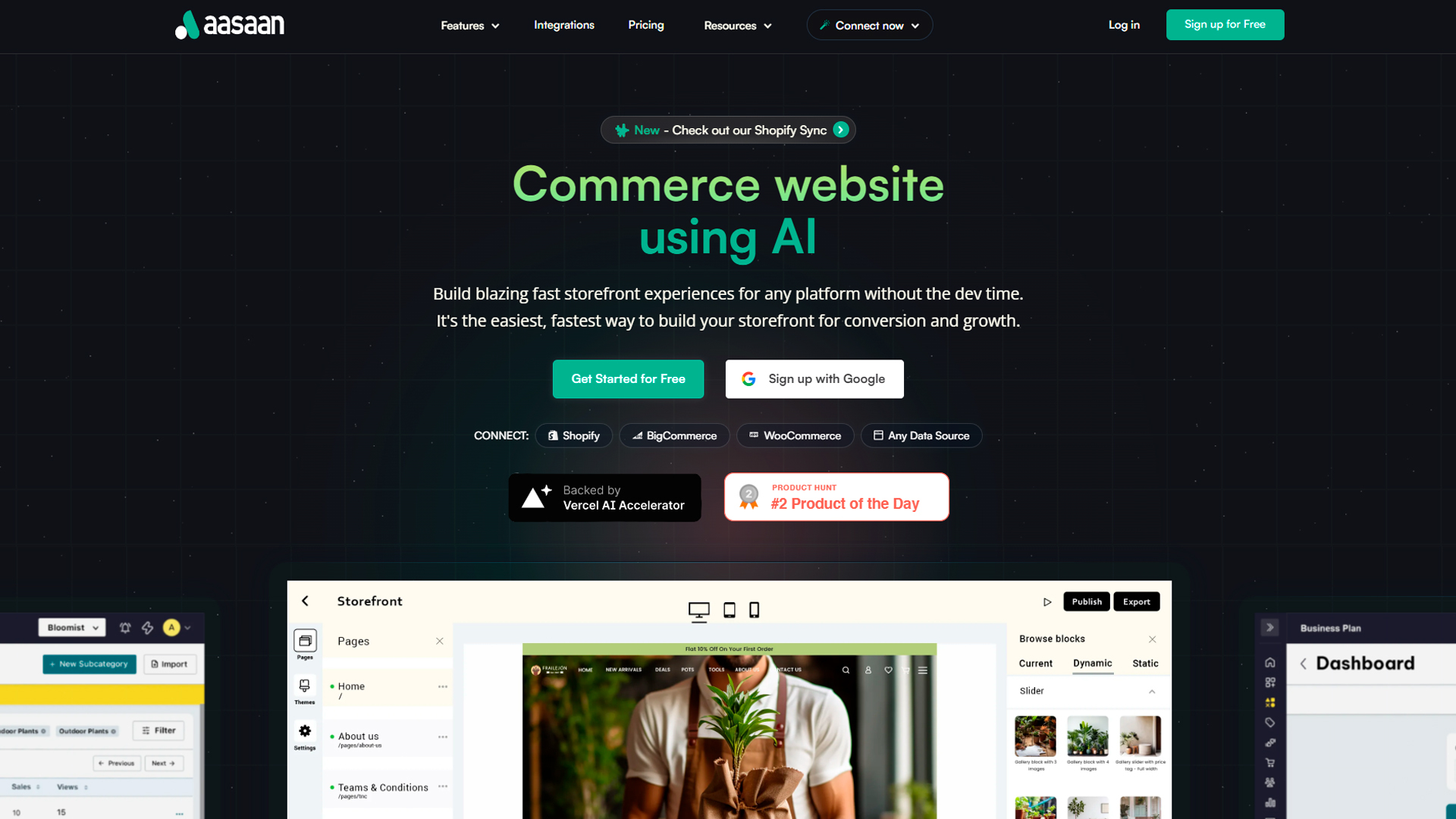
Aasaan is an all-in-one ecommerce solution that allows business owners to create, sell, market, and manage their online stores. It is designed to provide a user-friendly experience for individuals looking to start an ecommerce business.
Key Features of Aasaan
- Drag & Drop Storefront Builder: Aasaan App offers a headless storefront builder that allows users to visually build their online stores without the need for coding.
- Ecommerce Functionality: Users can create an online store and sell products or services through the Aasaan App platform.
- Marketing Tools: Aasaan App provides marketing features such as email campaigns, discounts, and promotions to help businesses attract and retain customers.
- Inventory Management: Users can easily manage their product inventory, track stock levels, and receive notifications for low stock.
- Mobile App: Aasaan App offers a mobile app that allows users to manage their online stores on the go.
- Analytics and Reporting: Users can access detailed analytics and reports on sales, customer behavior, and website performance.
- Integration: Aasaan App integrates with various third-party services and tools to enhance ecommerce functionality, such as payment gateways and shipping providers.
Pricing
- Premium plan: For merchants and startups to help grow business with branding. It costs $50 per month if billed annually or $65 per month if billed monthly.
- Business plan: Enables advanced merchants with advanced features. It costs $165 per month if billed annually or $200 per month if billed monthly.
- Enterprise plan: Unlimited scalability, greater control, and dedicated resources for D2C brands to scale. It requires you to contact sales for a custom quote.
2. Squarespace:
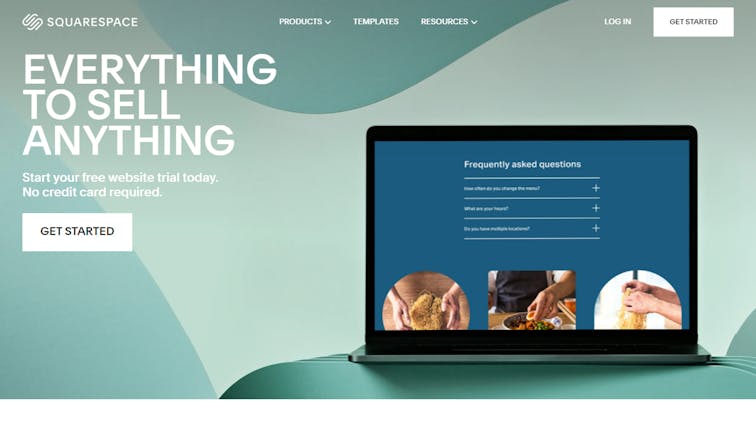
Squarespace is an American website building and hosting company based in New York City . It offers an all-in-one solution for creating customizable websites and online stores.
Squarespace provides software as a service (SaaS) for website building, making it easy for businesses and individuals to create professional and visually appealing websites without the need for extensive coding or design skills.
Key Features of Squarespace
- Website Templates: Squarespace offers a wide range of customizable website templates, allowing users to create visually stunning websites with ease.
- E-commerce Capabilities: Squarespace provides built-in e-commerce features, enabling users to set up and manage online stores, accept payments, and track inventory.
- Design Customization: Users can easily customize the design of their websites using Squarespace’s intuitive drag-and-drop interface, allowing for complete control over the look and feel of the site.
- Mobile Optimization: Squarespace websites are automatically optimized for mobile devices, ensuring a seamless browsing experience for users on smartphones and tablets.
- SEO Tools: Squarespace includes built-in SEO tools to help improve website visibility in search engine results and attract organic traffic.
- Analytics and Reporting: Users can access detailed analytics and reporting on their website’s performance, including visitor statistics, traffic sources, and more.
- Integration with Third-Party Services: Squarespace integrates with various third-party services, such as social media platforms and email marketing tools, to enhance website functionality and marketing capabilities.
Pricing
- Personal: $16 per month, best for starting a small website
- Business: $23 per month, best for small businesses
- Basic Commerce: $27 per month, best for small online stores
- Advanced Commerce: $65 per month
3. Adobe Commerce:
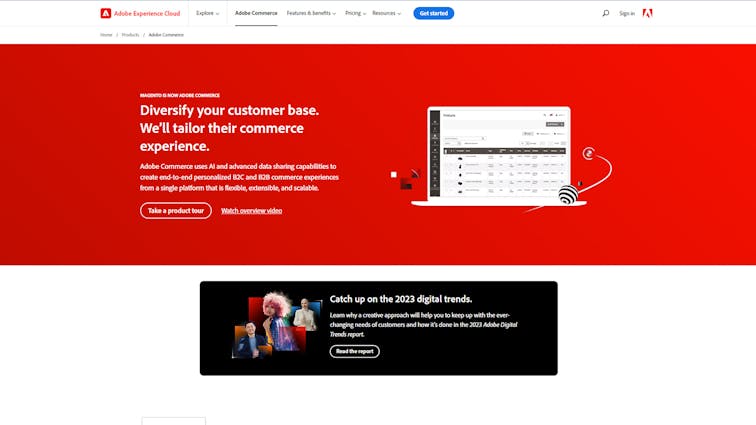
Adobe Commerce, formerly known as Magento Commerce, is a flexible and scalable commerce platform designed to enable businesses to create personalized B2B and B2C experiences. It offers a robust set of tools and features to help businesses build and manage their online stores.
Key Features of Adobe Commerce
- Personalization: Adobe Commerce enables businesses to create unique and personalized shopping experiences for their customers by tailoring content, promotions, and recommendations based on customer behavior and preferences.
- B2B and B2C Capabilities: The platform supports both B2B and B2C commerce, providing features specifically designed for businesses selling to other businesses.
- Multi-store Management: Adobe Commerce allows businesses to manage multiple stores from a single admin panel, simplifying the management of different brands, regions, or languages.
- Product Management: The platform offers advanced product management capabilities, including inventory management, product attributes, variations, and pricing options.
- Order Management: Adobe Commerce provides comprehensive order management features, enabling businesses to process orders, track shipments, handle returns, and manage customer communication.
- Payment and Shipping Options: The platform integrates with various payment gateways and shipping providers, giving businesses flexibility in offering convenient payment and shipping options to customers.
- SEO Optimization: Adobe Commerce is built to be SEO-friendly, providing tools and features to optimize online stores for search engines and improve visibility in search results.
- Extensibility and Customization: With a marketplace of extensions and themes, Adobe Commerce offers businesses the ability to customize and extend their online stores to meet specific requirements.
Pricing:
The pricing for Adobe Commerce starts at $22,000 per year for the initial installation. The price depends on a business’s average gross sales revenue. The price can range from $22,000 to $100,000 per year. Additional costs include:
- Web hosting: $14.99 to $39.99 per month
- Domain: $10 to $20 per year
- SSL certificate: $50 to $600 per year
- Web developer
4. Shopify:

Shopify is a worldwide commerce platform that enables businesses to create and manage their online stores. It offers a comprehensive suite of tools and features to assist entrepreneurs in starting, expanding, and scaling their businesses.
Key Features of Shopify:
- Store Builder: Shopify provides a user-friendly interface and drag-and-drop functionality, enabling the creation and customization of online stores without any coding knowledge.
- Mobile Commerce: The platform offers responsive themes and a mobile app, allowing businesses to manage their stores and process orders while on the move.
- Payment Gateway Integration: Shopify integrates with various payment gateways, enabling businesses to accept payments from customers all over the world.
- Inventory Management: Shopify provides tools to monitor and manage inventory, establish product variants, and regulate stock levels.
- Order Management: The platform allows businesses to manage customer orders, track shipments, and handle returns and refunds.
- Marketing and SEO: Shopify includes built-in marketing tools, such as SEO optimization, social media integration, and email marketing campaigns.
- App Store: Shopify features an extensive app store with a wide array of plugins and extensions to enhance the functionality of online stores.
Pricing:
Shopify offers various pricing plans to suit businesses of all sizes and needs. The plans include:
- Basic Shopify: Starting at $29 per month, this plan includes all the essential features required to establish a new online store.
- Shopify: Starting at $79 per month, this plan includes additional features for growing businesses, such as professional reports and abandoned cart recovery.
- Advanced Shopify: Starting at $299 per month, this plan includes advanced features like an advanced report builder and third-party calculated shipping rates.
- Shopify Plus: This plan is tailored for high-volume businesses and offers custom pricing based on individual requirements.
5. Yo!Kart
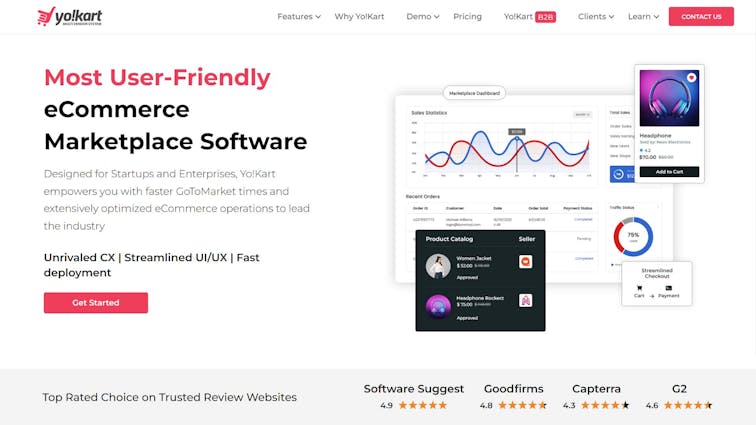
Yo!Kart is a comprehensive eCommerce marketplace software tailored for both startups and established enterprises. It offers a complete solution for businesses aiming to construct and initiate their own online marketplaces. With the functionalities provided by Yo!Kart, entrepreneurs are empowered to establish multi-vendor marketplaces akin to giants like Amazon, eBay, and Alibaba.
Key Features of Yo!Kart:
- Customizable Design: Yo!Kart provides the flexibility for business proprietors to modify design layouts, color schemes, content labels, and more, all without the necessity for coding knowledge.
- Seller Management System: The platform incorporates a user-friendly seller management system that simplifies the process of onboarding and managing sellers in the marketplace.
- Multi-Vendor Functionality: Yo!Kart accommodates multiple vendors, enabling businesses to invite and administer a diverse array of sellers in their marketplace.
- Order Management: Yo!Kart furnishes tools to proficiently manage customer orders, encompassing order tracking, invoicing, and fulfillment.
- Payment Gateway Integration: The platform facilitates integration with renowned payment gateways, ensuring secure and smooth transactions.
- SEO-Friendly: Yo!Kart is engineered to be search engine optimized, aiding businesses in attracting organic traffic and enhancing their visibility in search results.
- Mobile-Friendly: The software is responsive and compatible with mobile devices, guaranteeing a seamless user experience across various devices.
- Analytics and Reporting: Yo!Kart includes integrated analytics and reporting tools to assist businesses in monitoring and analyzing crucial metrics related to sales, customer behavior, and more.
Pricing:
Here are some of the Yo!Kart pricing packages:
- GoQuick: $999, with a default design
- GoCustom Lite: $3,999, with a partial custom design
- GoCustom: $6,999, with a fully custom design
- Go Quick Boost: $2,499
- Go Custom Prime: Contact Yo!Kart
Yo!Kart also offers a free trial.
6. WooCommerce
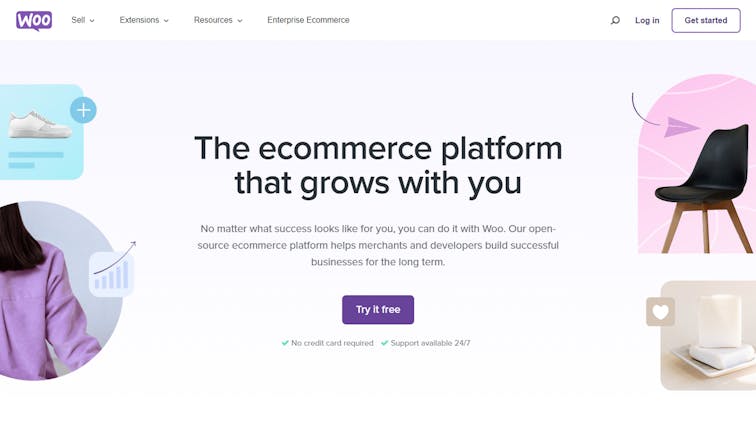
WooCommerce is an open-source e-commerce platform built on WordPress. It is a popular choice for merchants and developers looking to create successful online businesses. With WooCommerce, users have the flexibility to customize their e-commerce stores to meet their specific needs.
Key Features of WooCommerce
- Easy Setup: WooCommerce is user-friendly and can be easily installed as a plugin on a WordPress website.
- Product Management: Users can create and manage a wide range of products, including physical goods, digital downloads, and subscriptions.
- Inventory Management: WooCommerce provides tools to track inventory levels, set stock thresholds, and manage product variations.
- Payment Gateway Integration: The platform supports various payment gateways, allowing users to accept payments from different providers.
- Shipping Options: Users can set up shipping zones, calculate shipping rates, and offer multiple shipping methods to customers.
- Extensive Extensions: WooCommerce offers a vast library of extensions that can enhance the functionality of an online store, including marketing, analytics, and customer support tools.
- SEO Optimization: WooCommerce is built with SEO best practices in mind, enabling users to optimize their stores for search engines and increase visibility.
- Reporting and Analytics: Users can access detailed reports on sales, customer behavior, and website performance to make informed business decisions.
Pricing
WooCommerce is a free WordPress plugin, but you’ll need to pay for additional costs to get started. These costs include:
- Domain name: About $12 per year
- Hosting service: $5$-25 per month
- SSL certificate: $49-$99 per year
- Theme: Around $59
- Plugins and extensions: From $25 each
- Developer fees: $20-$150 per hour
7. PrestaShop:
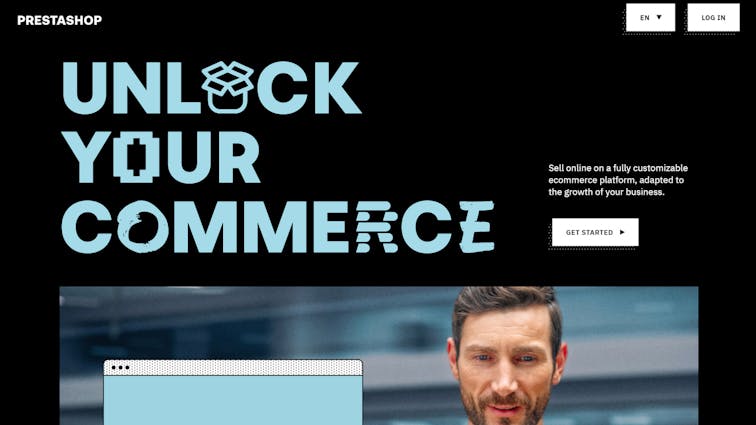
PrestaShop is a freemium, open-source e-commerce platform written in PHP and published under the Open Software License (OSL). It enables users to create and customize their online stores and provides a comprehensive set of features and tools to help businesses launch and manage their e-commerce websites.
Key Features of PrestaShop
- Store Customization: PrestaShop offers a wide range of themes and templates to customize the look and feel of an online store.
- Product Management: Users can easily create, manage, and organize their product catalog, including variations, attributes, and images.
- Inventory Management: PrestaShop provides tools to track and manage inventory levels, set stock thresholds, and receive notifications for low stock.
- Payment and Shipping Integration: The platform supports various payment gateways and shipping providers to facilitate smooth transactions.
- Marketing and Promotion: PrestaShop offers marketing features such as discounts, promotions, and cross-selling to help businesses attract and retain customers.
- Analytics and Reporting: Users can access detailed reports on sales, customer behavior, and website performance to make informed decisions.
- Multi-language and Multi-currency Support: PrestaShop allows users to create and manage online stores in multiple languages and currencies.
- SEO Optimization: The platform is built with SEO best practices in mind, allowing businesses to optimize their online stores for search engines.
Pricing:
PrestaShop itself is free and open-source, which means users can download and use the software without any licensing fees.
However, there may be additional costs associated with running a PrestaShop store, such as web hosting, domain registration, premium themes, and extensions. The overall cost of running a PrestaShop store will depend on individual needs and preferences.
It is recommended to visit the official PrestaShop website or consult with a web developer to get a more accurate estimate of pricing based on specific requirements.
8. Wix:
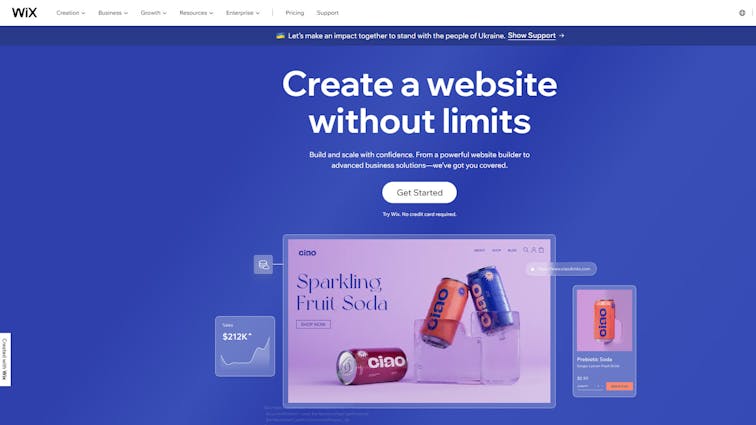
Wix is a popular website builder that allows users to create high-quality websites without the need for coding knowledge. It provides a drag-and-drop editor that enables users to easily customize the design and layout of their websites. Wix offers a range of features and tools to help individuals and businesses create and manage their online presence.
Key Features of Wix
- Drag-and-Drop Website Builder: Wix’s intuitive editor allows users to easily create and customize their websites by dragging and dropping elements onto the page.
- Templates: Wix offers a wide selection of professionally designed templates for various industries and purposes, making it easy to find a design that suits your needs.
- App Market: Users can enhance their websites with a variety of apps from the Wix App Market, including social media integrations, contact forms, online stores, and more.
- Mobile Optimization: Wix automatically optimizes websites for mobile devices, ensuring a seamless browsing experience for visitors on smartphones and tablets.
- SEO Tools: Wix provides built-in SEO tools to help users optimize their websites for search engines and improve their online visibility.
- E-commerce Functionality: Users can create and manage online stores with Wix, including product listings, inventory management, payment processing, and shipping options.
- Blogging: Wix offers blogging capabilities, allowing users to create and publish blog posts to engage with their audience.
- Analytics: Wix provides analytics tools to track website performance, including visitor statistics, traffic sources, and other key metrics.
Pricing:
Here are some key points about Wix pricing:
- Wix offers one free plan and eight premium plans.
- The premium plans range from $16 to $59-plus per month.
- The cheapest plan is the Light plan, which costs $16 per month and gives you an ad-free site.
- In addition to these four plans, Wix offers a custom plan for large enterprises.
9. Volusion:
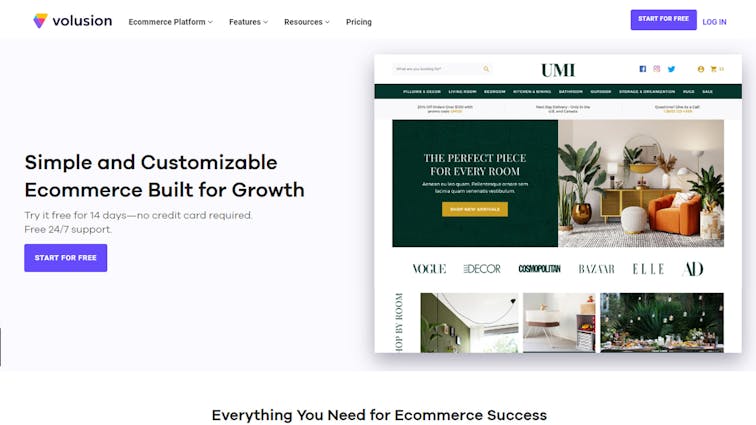
Volusion is an all-in-one e-commerce platform that provides businesses with the tools and resources they need to build, launch, and manage their online stores. It offers a range of features and functionalities to help businesses create a professional and user-friendly online shopping experience.
Key Features of Volusion
- Store Customization: Volusion provides a variety of free and premium themes and templates to customize the look and feel of your online store.
- Product Management: Users can easily create and manage their product catalog, including product variations, images, and descriptions.
- Inventory Management: Volusion offers inventory management tools to track and manage stock levels, set up low stock notifications, and handle backorders.
- Payment and Shipping Integration: The platform integrates with multiple payment gateways and shipping providers, allowing businesses to offer various payment options and streamline shipping processes.
- Marketing and SEO: Volusion provides marketing tools, such as discount codes, email marketing, and social media integrations, to help businesses attract and retain customers. It also offers SEO features to optimize the visibility of your store in search engine results.
- Analytics and Reporting: Volusion offers built-in analytics and reporting features to track sales, customer behavior, and website performance. This data can help businesses make data-driven decisions and improve their overall performance.
- Mobile Commerce: Volusion provides responsive design templates, ensuring a seamless shopping experience for customers on mobile devices.
- Customer Support: Volusion offers customer support through various channels, including phone, email, and live chat.
Pricing:
Volusion has four pricing plans:
- Personal: $29 per month
- Professional: $79 per month
- Business: $299 per month
- Prime: Custom pricing based on requirements and turnover.
10. BigCommerce:
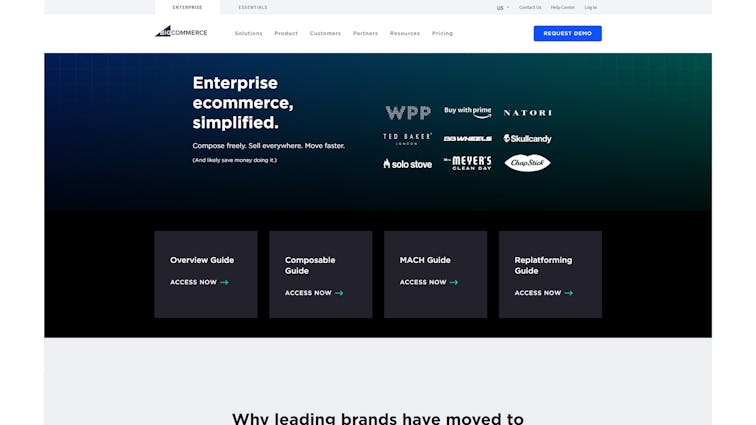
BigCommerce is a top-tier ecommerce platform that offers software as a service (SaaS) solutions for retailers across the spectrum. It enables merchants to construct, innovate, and expand their online businesses. BigCommerce provides a plethora of features and functionalities to assist businesses in efficiently creating and managing their online stores.
Key Features of BigCommerce
- User-Friendly Interface: BigCommerce boasts an intuitive and user-friendly interface, enabling merchants to effortlessly manage their online stores.
- Mobile-Optimized Stores: BigCommerce provides responsive themes and mobile-friendly designs, ensuring a seamless shopping experience for customers on all devices.
- Flexible Product Catalog: Merchants can easily manage and organize their product catalogs, including variations, options, and inventory management.
- Secure Checkout: BigCommerce prioritizes security by offering secure payment gateways and SSL certificates to safeguard customer data and transactions.
- Marketing and SEO Tools: The platform includes built-in marketing and SEO tools to assist merchants in optimizing their online stores for search engines and driving traffic.
- Integration Capabilities: BigCommerce integrates with a variety of third-party applications, such as shipping providers, marketing tools, and accounting software, to streamline operations.
- Analytics and Reporting: Merchants can gain insights into their store’s performance through detailed analytics and reporting features, enabling data-driven decision-making.
Pricing for BigCommerce
BigCommerce offers a variety of pricing plans to cater to the needs of businesses of all sizes. The pricing plans include:
- Standard: Starts at $39 per month. This plan is suitable for small businesses and offers essential features to get started with ecommerce.
- Plus: Starts at $105 per month. Designed for growing businesses, this plan provides additional features such as customer groups and abandoned cart recovery.
- Pro: Starts at $399 per month. Ideal for high-growth businesses, the Pro plan offers advanced features like Google customer reviews and faceted search.
- Enterprise: Pricing for the Enterprise plan is tailored to each customer’s specific requirements and provides advanced features, dedicated support, and customization options.
Ready to build your online store?
Are you ready to embark on the journey of building your own exceptional online store?
Look no further than Aasaan, the revolutionary no-code, API-first ecommerce platform that empowers businesses like yours to create next-generation shopping experiences effortlessly. Get Started for Free.
Unleash the Power of Visual Creation
With Aasaan’s headless storefront builder, you can craft high-converting online stores without the need for complex coding.
We’ve partnered with over 100 trusted allies to provide you with the ultimate ecommerce experience that’s both user-friendly and efficient.
Why Aasaan is the Perfect Choice for Your Brand:
Lightning-Fast Site Speed: Elevate your site speed by up to 70%, ensuring a seamless and swift shopping journey for your customers.
Boost Conversion Rates: Witness a remarkable 38% uplift in conversion rates, unlocking the true potential of your sales.
Elevated Average Order Value: Enjoy a remarkable 20% surge in average order value, driving substantial revenue growth per transaction.
Accelerated Time to Market: Achieve an impressive 10x faster time to market, enabling you to stay ahead of your competitors and capture opportunities swiftly.
Dedicated Customer Support: With our 24/7 professional and responsive customer support team, rest assured all your queries and concerns will be promptly resolved, ensuring a smooth user experience.
Scalability: Experience a scalable solution that grows alongside your business. Plus, with Aasaan, consign system crashes due to surge in traffic to history.
Robust Security: Your trust is our paramount Souvenir. Ensuring rigid security protocols, we guard your store against potential threats to let you conduct business with a peaceful mind.
Ready to kickstart your ecommerce journey with Aasaan? Unfold the new chapter of dynamic business growth. Get Started for Now.
FAQ’s On Best Ecommerce platforms on manufacturers:
1. Which ecommerce platform is best for sellers?
The best ecommerce platform for sellers varies based on their specific needs, such as the size of the business, the level of customization required, and the budget. However, some of the top-rated platforms include Aasaan, Shopify, BigCommerce, and WooCommerce. These platforms are known for their user-friendly interfaces, customization options, and robust features.
2. Which ecommerce platform is best for big business?
For larger businesses or enterprises, Magento, BigCommerce Enterprise, and Shopify Plus are often considered the best options. These platforms offer advanced features, higher scalability, and customization options that are necessary for managing a large volume of sales and customers.
3. Which is the fastest growing platform for ecommerce?
Shopify is often considered one of the fastest-growing ecommerce platforms due to its ease of use, scalability, and a wide range of features that cater to businesses of all sizes. However, other platforms like Aasaan, BigCommerce and WooCommerce are also growing rapidly.
4. What is the largest B2B platform?
Alibaba is currently the largest B2B platform in the world. It connects suppliers and buyers from over 200 countries and regions.



